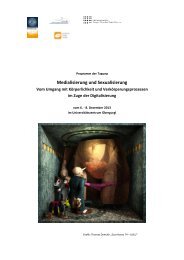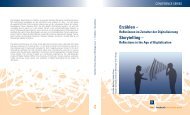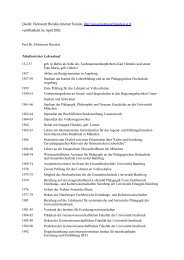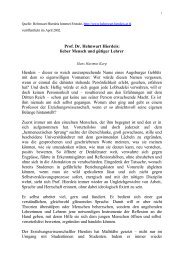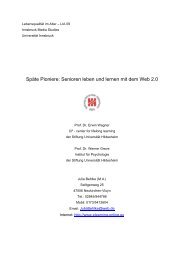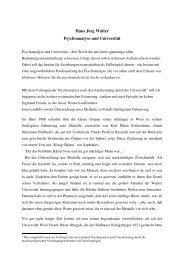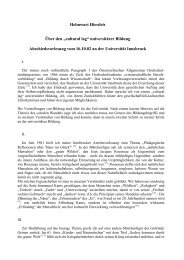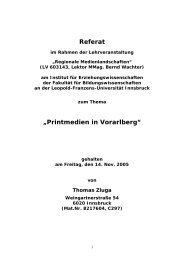Download pdf - Universität Innsbruck
Download pdf - Universität Innsbruck
Download pdf - Universität Innsbruck
Erfolgreiche ePaper selbst erstellen
Machen Sie aus Ihren PDF Publikationen ein blätterbares Flipbook mit unserer einzigartigen Google optimierten e-Paper Software.
92 Sebastian Sevignani<br />
2.1 Private property<br />
If one speaks of exchanging something, it is presupposed that there are (natural or artificial)<br />
people who have the control to provide something to others. As well, it is presupposed<br />
that others are excluded from control over something, otherwise they can simply<br />
take it without providing something in turn and no exchange would take place. In other<br />
words, exchange presupposes the institution of the right to exclude others from the use and<br />
benefit of something, which is the individual right to property (see Munzer, 2005, p. 858).<br />
Private property does not coincide with property at all; we can distinguish different forms<br />
of property. Macpherson, for instance, speaks about three possible forms: private property,<br />
state property, and common property. He points out that private property and state property<br />
are of similar structure (see Macpherson, 1978, p. 5). Both are about excluding others,<br />
whereas common property is about “the guarantee to each individual that he will not be<br />
excluded from the use or benefit of something” (Macpherson, 1978, p. 5). A culture of<br />
exchange, as it is based on private property, is only possible where a relation of exclusion<br />
among people exists. Such exclusion is the very opposite of the common (see Benkler,<br />
2006, p. 60).<br />
The commodity fetish, which has its reason in the “hidden” sociality of exchange, affects<br />
not only day-to-day thinking of marketers, but is also reflected in economical, ethical, and<br />
philosophical theory. Macpherson has detected consequences of exchange for philosophical<br />
thinking within his interpretative analysis of the most important liberal thinkers, from<br />
Hobbes to Locke (see Macpherson, 1962, pp. 4–8): With the rise of capitalism and a culture<br />
of exchange, the “relation of ownership, having become for more and more men the<br />
critically important relation determining their actual freedom and prospect of realizing<br />
their full potentialities, was read back into the nature of the individual” (Macpherson 1962,<br />
p. 3). Macpherson speaks in this context of “possessive individualism” as the central ideology<br />
of modern society. Within possessive individualism, an individualistic notion of<br />
man merges into justifications of private property. Possessive individualistic thinking consists<br />
of a complex of postulates derived from a negative notion of freedom from man’s<br />
dependency on other men. This notion of freedom fits perfect with people’s circulation<br />
sphere based on self-understanding and the “hidden” sociality of exchange. It appears that<br />
the individual is already complete before it enters social relations. Macpherson, and an<br />
echo of Marx’s arguments according to the commodity fetish are salient in this, argues:<br />
“since the freedom, and therefore the humanity, of the individual depend on<br />
his freedom to enter into self-interested relations with other individuals, and<br />
since his ability to enter into such relations depends on his having exclusive<br />
control of (rights in) his own person and capacities, and since' proprietorship<br />
is the generalized form of such exclusive control, the individual is essentially<br />
the proprietor of his own person and capacities” (Macpherson, 1962, p. 263).



